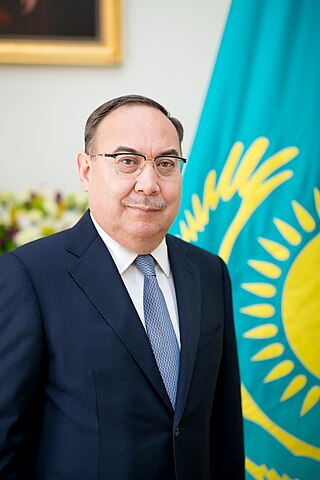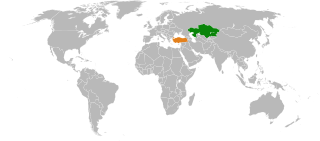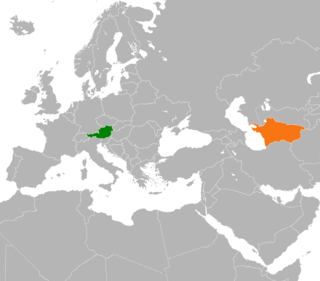
Foreign relations of Kazakhstan are primarily based on economic and political security consideration. The Nazarbayev administration has tried to balance relations with Russia and the United States by sending petroleum and natural gas to its northern neighbor at artificially low prices while assisting the U.S. in the War on Terror. Kazakhstan is a member of the United Nations, Collective Security Treaty Organization, Organization for Security and Co-operation in Europe, North Atlantic Cooperation Council, Commonwealth of Independent States, the Shanghai Cooperation Organisation, and NATO's Partnership for Peace program. Kazakhstan established a customs union with Russia and Belarus which eventually became the Eurasian Economic Union. President Nazarbayev has prioritized economic diplomacy into Kazakhstan's foreign policy.

Although there has been a large degree of integration between European Union member states, foreign relations is still a largely intergovernmental matter, with the 27 states controlling their own relations to a large degree. However, with the Union holding more weight as a single entity, there are at times attempts to speak with one voice, notably on trade and energy matters. The High Representative of the Union for Foreign Affairs and Security Policy personifies this role.

Erzhan Hozeuly Kazykhanov is a Kazakh politician who serves as diplomat. Kazykhanov holds a newly created position in the presidential administration with the title of Special Representative for International Cooperation. Prior to his appointment as the Ambassador to the U.S., Kazykhanov has served as Kazakhstan's Ambassador to the United Kingdom of Great Britain and Northern Ireland. Before becoming Ambassador to the UK, he held the position of Assistant to the President of the Republic of Kazakhstan and Minister of Foreign Affairs of Kazakhstan. He previously served as the Deputy Minister of Foreign Affairs of Kazakhstan, as well as the Ambassador of Kazakhstan to Austria, Permanent Representative of Kazakhstan to the International Organizations in Vienna and Permanent Representative to the United Nations in New York.

Kazakhstan–South Korea relations are the international relations between Kazakhstan and the South Korea.

Austrian-Moldovan relations are foreign relations between Austria and Moldova. Both countries established the diplomatic relations on 25 March 1992. Austria is represented in Moldova through its embassy in Bucharest (Romania) and through an honorary consulate in Chişinău. Moldova has an embassy in Vienna and an honorary consulate in Innsbruck. Austria supports Moldova's European Union membership.

Kazakh–Turkish relations are foreign relations between Kazakhstan and Turkey. Turkey recognized Kazakhstan on 16 December 1991, being the first state to recognize the independence of Kazakhstan, when Kazakhstan declared its independence. Diplomatic relations between the two countries were established on 2 March 1992. These relations have developed positively on the international stage as well as in commerce and strategic affairs. Kazakhstan has an embassy in Ankara and a consulate general in Istanbul. Turkey has an embassy in Astana and a branch office in Almaty.

Czech Republic–Kazakhstan relations are bilateral relations between the Czech Republic and Kazakhstan.

Austria–Canada relations refers to the diplomatic relations between the Republic of Austria and Canada, the importance of which centres on the history of Austrian migration to Canada. Approximately 200,000 Canadians have Austrian ancestry. Both nations are members of the OECD and the United Nations.

Indonesia–Kazakhstan relations refer to bilateral relations between Indonesia and Kazakhstan. The two countries officially established relations in 1993 and share some similarities; both countries possess abundance of natural resources, have predominantly Muslim populations with significant Christian minorities, ensure harmonious diversity and a commitment to human rights and democracy. Both nations have agreed to increase cooperation in several economic sectors, such as agriculture, industry, pharmaceuticals, petroleum, transportation infrastructure and machinery manufacture. Indonesia has an embassy in Astana, while Kazakhstan has an embassy in Jakarta. Both nations are members of the Asia Cooperation Dialogue, Organisation of Islamic Cooperation and the United Nations.

Bilateral relations exist between Austria and Turkmenistan. Turkmenistan maintains an embassy in Vienna, where the current Ambassador of Turkmenistan to Austria is Mr. Nurberdiyev Sylapberdi Ashyrgeldiyevich. Austria has an embassy with residence in Astana (Kazakhstan) where the current Ambassador of Austria to Kazakhstan and Turkmenistan, Tajikistan, Kyrgyzstan is Mr. Wolfgang Banyai

Kazakhstan–Serbia relations refer to bilateral relations between Kazakhstan and Serbia. Serbia opened an embassy in Astana in June 2011, and Kazakhstan opened a consulate in Belgrade in June 2015.

Diplomatic relations between the Federal Republic of Germany and the Republic of Kazakhstan were established in 1991 after Kazakhstan gained independence from the former Soviet Union. Ethnic Germans and ethnic Kazakhs have a shared history dating back to World War II when ethnic Germans living in the Volga region of Russia were relocated or imprisoned in the eastern steppe of the Soviet Union in what is today the territory of Kazakhstan. At the collapse of the former Soviet Union, about one million ethnic Germans lived in Kazakhstan.

Finland–Kazakhstan relations refers to the bilateral relations between Finland and Kazakhstan. Finland has an embassy in Nur-Sultan whilst Kazakhstan has an embassy in Helsinki. Both countries are members of Organization for Security and Co-operation in Europe.

Kazakhstan–Netherlands relations refer to the bilateral relations between Kazakhstan and the Netherlands. The Netherlands has an embassy in Astana. Kazakhstan has an embassy in The Hague.

Kazakhstan–Poland relations refer to bilateral relations between Kazakhstan and Poland. Relations focus on growing trade and politicial cooperation. Both countries are members of the Organization for Security and Co-operation in Europe, World Trade Organization and United Nations.

France–Kazakhstan relations are the diplomatic relations between France and Kazakhstan. Both nations are members of the Organization for Security and Co-operation in Europe.

Kazakhstan–Qatar relations are the bilateral relations between the Republic of Kazakhstan and the State of Qatar. Diplomatic relations were established in 1993. Kazakhstan has an embassy in Doha. Qatar has an embassy in Astana.

The C5+1 is a diplomatic summit that has been held every year since 2015 between the foreign ministers of the five Central Asian countries of Kazakhstan, Kyrgyzstan, Tajikistan, Turkmenistan, and Uzbekistan, with the United States Secretary of State to discuss and work on common issues of concern to improve and strengthen the U.S. relationship with the five Central Asian states, but to also enhance the relations between the individual nations in Central Asia. The format is used to discuss regional issues such as the war in Afghanistan, the Syrian civil war, the War on terror, combatting drug and human trafficking, economic issues regarding trade relations, job growth in the region, and combatting environmental issues.





















